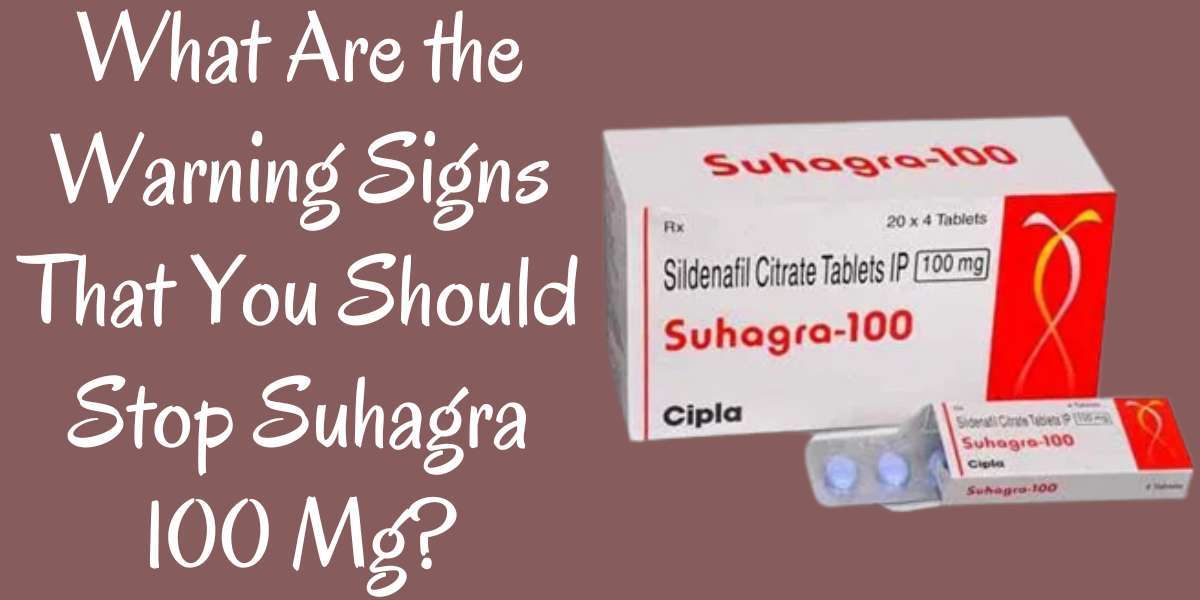Suhagra 100 mg, a popular brand of Sildenafil Citrate, is widely used for treating Erectile disorder. By increasing blood flow to the penis, it helps men achieve and maintain erections during sexual activity. While Suhagra 100 is generally safe when taken as prescribed, it’s crucial to be aware of certain warning signs that indicate you should stop using it immediately. Ignoring these signs can lead to serious health complications.
In this article, we’ll explore how Suhagra works, common side effects, the critical warning signs to watch for, and what steps you should take if you experience any adverse reactions.
How Suhagra 100 mg Works
Suhagra belongs to a class of medications called phosphodiesterase type 5 (PDE5) inhibitors. When you take Suhagra, it relaxes the muscles in the blood vessels of your penis, allowing increased blood flow, which facilitates an erection in response to sexual stimulation.
The typical recommended dose is 50 to 100 mg taken about an hour before sexual activity. It should be used under a doctor’s supervision to ensure it’s safe for you, especially if you have underlying health conditions.
Common Side Effects: Usually Mild and Temporary
Many men experience mild side effects with Suhagra, which often resolve without stopping the medication. These include:
- Headache
- Flushing (redness or warmth in the face)
- Indigestion or upset stomach
- Nasal congestion
- Dizziness
- Temporary changes in vision (such as a blue tint)
These side effects, although uncomfortable, are usually not dangerous. However, if they persist or worsen, consult your healthcare provider.
Serious Warning Signs: When You Should Stop Suhagra Immediately
While Suhagra is safe for most men, some side effects can indicate a medical emergency. If you experience any of the following symptoms, stop taking Suhagra immediately and seek medical help:
- Cardiovascular Symptoms
Suhagra can affect your heart and blood vessels. Warning signs include:
- Chest pain or pressure: This could signal a heart attack.
- Irregular heartbeat or palpitations
- Shortness of breath or difficulty breathing
- Fainting or severe dizziness
If you have heart disease or have had a stroke, these symptoms should be taken very seriously.
- Allergic Reactions
Though rare, some men may develop a severe allergic reaction called anaphylaxis. Warning signs include:
- Swelling of the face, lips, tongue, or throat
- Rash, itching, or hives
- Difficulty breathing or swallowing
An allergic reaction is a medical emergency requiring immediate treatment.
- Severe Vision or Hearing Problems
Sudden changes in vision or hearing require urgent attention:
- Sudden vision loss in one or both eyes (a rare but serious side effect)
- Ringing in the ears or sudden hearing loss
If you notice these symptoms, stop Suhagra 100mg and consult a doctor immediately.
- Priapism (Prolonged Erection)
A prolonged erection lasting more than 4 hours, known as priapism, can cause permanent damage to the penile tissue if not treated promptly. Symptoms include:
- Painful erection lasting longer than usual
- Swelling and discomfort
Seek emergency medical care if you experience this, as it can lead to lasting erectile dysfunction.
- Severe Drop in Blood Pressure
Suhagra may lower blood pressure, especially when combined with certain medications (like nitrates) or alcohol. Warning signs include:
- Feeling faint or lightheaded after standing up
- Cold, clammy skin
- Blurred vision with weakness or confusion
If these occur, stop taking the medication and get medical help.
Who Is at Higher Risk?
Certain groups of people are more vulnerable to serious side effects and should exercise extra caution:
- Men with heart disease, history of stroke, or uncontrolled blood pressure
- Those taking nitrates (often prescribed for chest pain) or alpha-blockers (used for prostate problems)
- Men with liver or kidney impairment
- Older adults, who may have decreased drug metabolism
- Users of recreational drugs like “poppers” (nitrites)
If you fall into any of these categories, discuss alternatives or dosage adjustments with your doctor.
What to Do If You Experience Warning Signs
If you notice any serious symptoms:
- Stop taking Suhagra immediately.
- Seek emergency medical attention if symptoms are severe (such as chest pain, difficulty breathing, or vision loss).
- Do not self-medicate or take additional doses thinking symptoms will improve.
- Inform your healthcare provider about the side effects, so they can recommend safer alternatives or adjust your treatment.
Safe Use Guidelines for Suhagra 100 mg
To minimize risks, follow these safety tips:
- Only take Suhagra when prescribed by a doctor.
- Avoid consuming alcohol or grapefruit juice while on Suhagra as they can affect drug metabolism.
- Always disclose all medications and supplements you take to your doctor.
- Follow the prescribed dosage; do not increase or take multiple doses.
- Be honest about your medical history, especially heart or blood conditions.
Conclusion
Suhagra 100 mg is a highly effective medication for Sexual impotence when used responsibly. However, recognizing the warning signs that indicate you should stop taking it can protect you from serious health risks. Mild side effects are common and often harmless, but symptoms like chest pain, allergic reactions, sudden vision or hearing loss, prolonged erections, or fainting require immediate medical attention.
Always communicate openly with your healthcare provider about your experience with Suhagra, and never hesitate to seek emergency care if you encounter alarming symptoms. Your health and safety should always come first.







